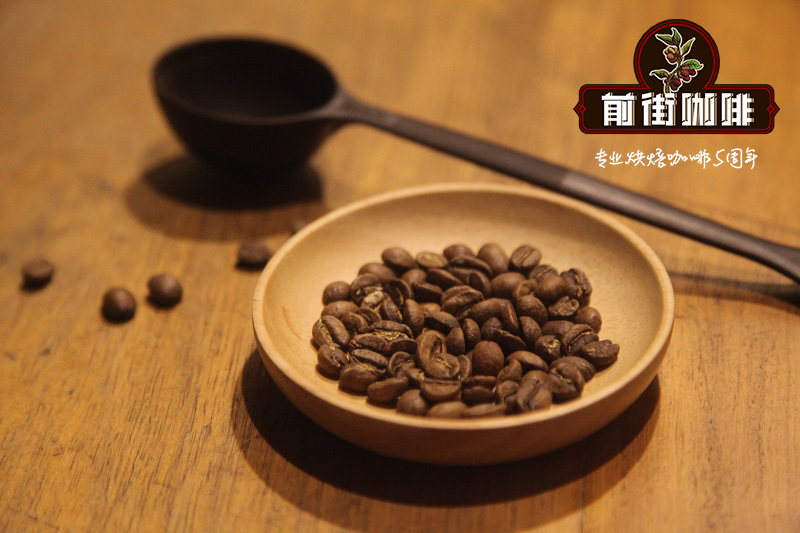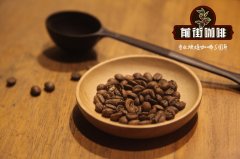What is the Kenyan race coffee? the complex berry aroma of Kenyan coffee beans.

Professional coffee knowledge exchange more coffee bean information please follow the coffee workshop (Wechat official account cafe_style)
Qianjie-Kenyan Coffee introduction
Kenya's main coffee producing areas are around Mount Kenya, the highest mountain in the country, which is the second highest peak in Africa after Mount Kilimanjaro, many plantations have good elevations, and the diurnal temperature difference at high altitudes helps to prolong the coffee ripening cycle and gather flavor substances, such as our bean planting in Embu this time at an altitude of 1800m. Kenyan coffee is highly recognizable and is famous for its bright and complex berry and fruit flavors, with sweet flavors and dense acidity.
As a neighbor of Ethiopia, Kenya was not immune from the tide of colonialism as Ethiopia did. The first coffee was grown on large estates under British colonial rule, and the harvested beans were shipped back to London for sale. Coffee production was not returned to Kenya until the 1950s. It has always been believed that, as a kind of agricultural product, if you want to have a place in the competition, in addition to the weather and geographical location, it is also inseparable from human harmony, and Kenya has absolutely exerted the "human harmony" to the extreme.
Bourbon Bourbon was first brought to Kenya for planting. In the 1950s, the then agricultural research institution ScottLaboratory selected two excellent hybrids, SL-28 and SL-34, through unremitting efforts, subverting the long-standing prejudice of artificial breeding without excellent natural varieties. SL-28 and SL-34 help Kenyan coffee to form its own unique flavor characteristics and establish a perfect reputation in the coffee industry.
Kenyans attach great importance to coffee science, and many farmers have highly professional knowledge of production, as we have chosen SL-28,SL-34 (all Arabica species). The two coffee beans, which use code names, are from the Scott lab (SL stands for laboratory acronym). The laboratory has been employed by the Kenyan government since the 1930s, and the two varieties are two of the 40 planned varieties, which account for the majority of Kenyan high-quality coffee and are grown in large quantities in major producing areas.
Although the yield of SL28 was not as high as expected the copper leaf color and broad bean-shaped beans have great sweetness balance and complex flavor as well as significant citrus and black plum characteristics. SL34 is similar to SL28 in flavor, with a heavier, fuller and cleaner finish than SL28, except for the complex acidity and great sweetness of the finish. SL34 has French missionaries, bourbon, and more Tibica ancestry. Dou looks similar to SL28, but is more adaptable to sudden heavy rain. It is these two important varieties that lead us to the unique Kenyan style: strong acidity, rich taste and beautiful balance.
In short: Qianjie is a coffee research hall, happy to share the knowledge about coffee with you, we share unreservedly just to make more friends fall in love with coffee, and there will be three low-discount coffee activities every month. The reason is that Qianjie wants to make more friends drink the best coffee at the lowest price, which has been Qianjie's tenet for 6 years!
END
Important Notice :
前街咖啡 FrontStreet Coffee has moved to new addredd:
FrontStreet Coffee Address: 315,Donghua East Road,GuangZhou
Tel:020 38364473
- Prev

Is the variety of Hawaiian coffee beans Arabica? how to teach you how to handle kona coffee?
Professional coffee knowledge exchange more coffee bean information please follow the coffee workshop (Wechat official account cafe_style) front street-Hawaii Kona Coffee introduction Hawaiian Kona coffee beans have the perfect appearance, its fruit is unusually full and shiny. The taste of coffee is rich and aromatic, with cinnamon flavor, and the acidity is well balanced. Hawaii
- Next

Kenyan coffee bean brand recommends the unique flavor of Kenyan coffee beans.
Professional coffee knowledge exchange more coffee bean information please follow the coffee workshop (Wechat official account cafe_style) front street-Kenya Coffee was first introduced to Kenya, Kenya is a British colonial country, the then British colonial government in order to earn foreign exchange, widely promote coffee cultivation in Kenya, after the harvest of coffee beans are shipped to London for export sales. Until 1933
Related
- Beginners will see the "Coffee pull flower" guide!
- What is the difference between ice blog purified milk and ordinary milk coffee?
- Why is the Philippines the largest producer of crops in Liberia?
- For coffee extraction, should the fine powder be retained?
- How does extracted espresso fill pressed powder? How much strength does it take to press the powder?
- How to make jasmine cold extract coffee? Is the jasmine + latte good?
- Will this little toy really make the coffee taste better? How does Lily Drip affect coffee extraction?
- Will the action of slapping the filter cup also affect coffee extraction?
- What's the difference between powder-to-water ratio and powder-to-liquid ratio?
- What is the Ethiopian local species? What does it have to do with Heirloom native species?

